Disclaimer: The opinions expressed in this guest post are solely those of the author and are not necessarily reflective of Live Action or Live Action News.
Equality. That is the main object of the pro-life movement, which was founded as a human rights movement dedicated to securing equal rights for preborn humans. It was formed in response to 20th-century efforts to repeal the nationwide bans on elective abortion that protected the preborn for generations in the United States.
Pennsylvania Congressman Thaddeus Stevens in his 1867 speech advocating for equal rights for African-Americans said, “every man, no matter what his race or color; every earthly being who has an immortal soul, has an equal right to justice, honesty, and fair play with every other man; and the law should secure him these rights.” To borrow from this logic, every human, no matter what their place in this world — inside the womb or outside; every earthly being who has an immortal soul, has an equal right to justice, honesty, and fair play with every other human; and the law should secure them these rights.
The same law which protects a born human should protect a preborn human. The same law which protects a preborn human from a violent or homicidal act by their father or a stranger should protect a preborn human from such conduct by their mother or a doctor. Such is the law of God, such is the law of the Fourteenth Amendment, and such ought to be the law crafted by the United States Supreme Court in Dobbs v. Jackson Women’s Health Organization.
The case for fetal rights is as simple as it is undeniable.
First, as evinced by scientific journals, thousands of pro-choice biologists, and countless abortion advocates — developing human zygotes, embryos, and fetuses are living humans.
Second, in the law, “person” refers to all “natural persons” (which entail all living humans) and all “artificial persons” (which entail all corporations and entities deemed to be deserving of rights as part of a legal fiction).
Finally, the Fourteenth Amendment’s guarantee of equal legal protections to all persons — which the amendment’s ratifiers declared was protective of all living humans regardless of any distinction — was not only understood to include preborn humans at the time of its passage, but it must be interpreted to include them today since there is no dispute on the preborn’s status as human.
The Court in Roe v. Wade held that the recognition of fetal rights would cause the case for abortion rights to “collapse”; in subsequent cases, justices who formed Roe’s majority further confirmed that if the humanity of the preborn were established, “the permissibility of terminating the life of a fetus could scarcely be left to the will of the state legislatures” because fetal rights would then be guaranteed by the Fourteenth Amendment.
READ: ‘Pro-birth’: Without the right to life, there can be no other rights
Given this, why do so few in the conservative legal movement advance this argument? Why is it not the subject of even one of the seventeen pieces published in National Review’s special issue “End Roe”? Why did Princeton’s professor Robert George’s analysis of the eighty briefs filed in support of Mississippi’s abortion ban reveal that only one-fifth of the briefs argued for fetal rights?
Mary Ziegler, a leading expert on the legal debate about abortion in the U.S., suggests that leaders of the conservative legal movement believe they need to hide their true intentions until they can push for fetal rights in the future.
The U.S. Supreme Court squarely asked the Nation if “all pre-viability prohibitions on elective abortions are unconstitutional”. The honest answer from opponents of abortion access is: No, the Fourteenth Amendment’s Equal Protection Clause guarantees that all humans, born and preborn, are deserving of equal protection under the law, so pre-viability prohibitions on elective abortions are not only constitutional but are required by the U.S. Constitution.
Instead, the tepid and, quite frankly, dishonest answer from many of the briefs was: No, because abortion hurts women; No, because the Roe Court relied on a false history of abortion laws; No, because states continuously challenge Roe.
It is paternalistic and condescending to suggest that a woman should not be able to have an abortion simply because it is bad for her; it is unrealistic to believe that the Court would overturn a 48-year-precedent that millions of Americans support on the basis that the Roe Court’s original arguments were historically inaccurate; finally, it is ridiculous to suggest that a precedent should be overturned solely because states disagree with it. If numerous states had disagreed with Brown v. Board and continued to segregate people based on race, would the Court have been compelled to overturn its decision?
This is all just noise.
The signal of any effort to restrict abortion access is the protection of preborn humans — the object of securing equal rights for all humans, born and preborn. If the Court focuses on the noise, then abortion supporters will be bolstered in their claim that their opponents merely aim to control women. Instead, if the Court affirms fetal rights, then the reasonable part of our Nation will recognize permissive abortion laws for what they are: an unconstitutional infringement on the rights and equality of preborn humans.
Steve Jacobs is the program director of Illinois Right to Life. He received his J.D. from the Northwestern University School of Law and his Ph.D. from the University of Chicago; his dissertation, “Balancing Abortion Rights and Fetal Rights: A Mixed Methods Mediation of the U.S. Abortion Debate”, focused on Americans’ common ground in the national abortion controversy.
“Like” Live Action News on Facebook for more pro-life news and commentary!







